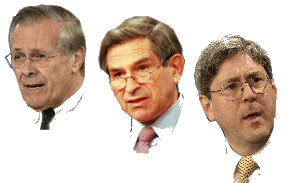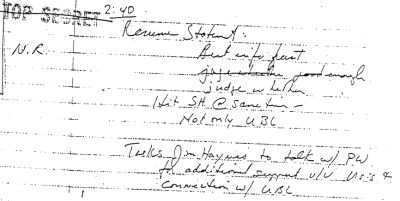Pentagon Group Criticized for Prewar Intelligence Analysis
Working under Douglas J. Feith, who at the time was under secretary of defense for policy, the group “developed, produced and then disseminated alternative intelligence assessments on the Iraq and Al Qaeda relationship, which included some conclusions that were inconsistent with the consensus of the Intelligence Community, to senior decision-makers,” the report concluded.…The conclusions the Pentagon team reached in the year or so before the invasion of Iraq have been generally known for some time and were largely discredited by the Sept. 11 commission, which found “no evidence” that contacts between the Iraqi government and Al Qaeda “ever developed into a collaborative operational relationship.”…The Feith operation dates to shortly after the Sept. 11 terrorist attacks, when the Pentagon established a small team of civilians to sift through existing intelligence with the aim of finding possible links between terror networks and governments. Bush administration officials contended that intelligence agencies were ignoring reports of collaboration between Iraq and Al Qaeda.

A couple of months before Bush was elected, the Project for the New American Century published a report Rebuilding America’s Defenses. The panel included a few familiar faces – Paul Wolfowitz, I. Lewis Libby, William Kristol. The panel lamented the decrease in Defensespending during the Clinton Administration and recommended a hefty increase in spending "to meet the strategic demands of the world’s sole superpower." One member of that panel was Stephen Cambone from the National Defense University. He was also on the panel in January 2001 at the National Institute for Public Policy [with Stephen Hadley] that recommended the use of Tactical Nuclear Weapons.
With Bush’s inauguration, Cambone became Rumsfeld’s Director of Program Analysis and Evaluation [known as Rumsfeld’s "henchman"]. He is the author of the notes from a meeting with Rumsfeld on 9/11 that said "Hit S.H. [Saddam Hussein] @ the same time – Not only UBL [Osama Bin Laden]."
- Rumsfeld assumed Saddam Hussein was behind the attack because of the Administration’s bias against Iraq – making a "categorical error."
- The Administration had ignored the Al Qaeda threat in hopes of an attack that would justify invading Iraq.
When Congress [Select Senate Committee on Intelligence] began to investigate the pre-war intelligence failure, they planned two reports. Phase I was to focus on the Intelligence Agencies, and Phase II was to focus on the Administration. After Phase I was released in July 2004, Phase II just didn’t happen. Chairman Pat Roberts just couldn’t seem to get around to it – "busy." But one of the stated reasons for the foot dragging was awaiting the results of the Pentagon’s internal study.
A special unit run by former Defense Secretary Donald Rumsfeld’s top policy aide inappropriately produced "alternative" prewar intelligence reports on Iraq that wrongly concluded Saddam Hussein’s regime had cooperated with Al Qaeda, a Pentagon investigation has determined.
The Department of Defense Inspector General’s Office found that former Undersecretary of Defense Douglas Feith and his staff had done nothing illegal.
But Sen. Carl Levin (D-Mich.), who requested the investigation, called the findings "devastating" because senior administration officials, particularly Vice President Dick Cheney, used Feith’s work to help make their case for the 2003 U.S. invasion of Iraq.
"We went to war based on the argument of the administration . . . that there was a link between Al Qaeda and Saddam Hussein and that Saddam Hussein could give Al Qaeda and other terrorist groups weapons," Levin said in an interview. The findings, he said, "are about as damning a statement as one can hear."
Pentagon Acting Inspector General Thomas Gimble was to present the investigation’s classified findings Friday to the Senate Armed Services Committee, which Levin heads. Levin and Sen. Jay Rockefeller (D-W.Va.), chairman of the Senate Intelligence Committee, disclosed the conclusions of an unclassified summary Thursday.
Feith, who resigned from the Pentagon in 2005 and now teaches at Georgetown University, said he has been exonerated.
"The policy office has been smeared for years by allegations that its pre-Iraq war work was somehow `unlawful’ or `unauthorized’ and that some information it gave to congressional committees was deceptive or misleading," he said in a statement. "The inspector general’s report has now thoroughly repudiated the smears."
But Rockefeller said in a statement that he would examine whether Feith had violated the 1947 National Security Act.
Notice that in Feith’s declaration that he’s been exonerated, he says he did nothing "unlawful." While a strong question about that remains, he’s using the same excuse the Administration used with their "outing" of Valerie Plame – nothing illegal. That may be or not be true, but that doesn’t exonerate them. They did something horrible, something dishonest, and in the opinion of many of us, something treasonous. They consciously lied to the American people to justify a huge war that never needed to be fought.
Senators Carl Levin and Jay Rockefeller have been on this case for years, but have been blocked by the Republican-controlled Senate. It’s time for them to get the ball rolling! This is the other arm of the pre-war intelligence debacle, the fictitious connections between Iraq and Al Qaeda. They’re all gone now – Rumsfeld, Wolfowitz, Cambone, and Feith. They’re gone, but not forgotten…

Sorry, the comment form is closed at this time.